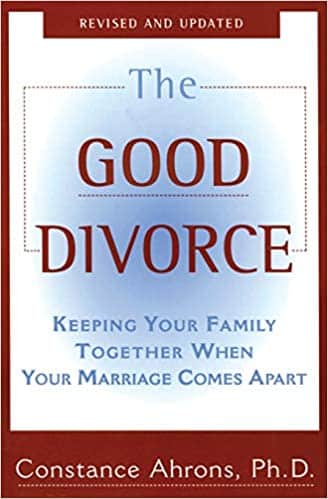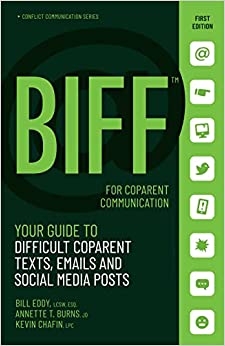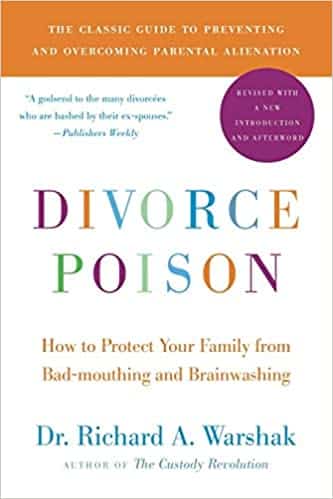Divorce is one of the hardest and most painful events a person can experience in their lifetime. Add kids into the mix, and divorce can feel impossibly difficult to navigate in a way that feels “successful.” The good news is that you’re not alone: millions of people get divorced, which means there is a ton of help out there for those who seek it, including some excellent books. Having worked with divorcing and divorced family systems for many years, I have accumulated dozens of books and workbooks with guidance for people affected by divorce. Here are the ones I recommend most often to my own clients.
For People Who Want a Better Divorce
Getting To Yes with Yourself: How to Get What You Truly Want
By William Ury
This is not, specifically, a divorce book. However, it is probably one of the best books you can read (or listen to) if you’re currently in the midst of divorce negotiations. Written by one of the best mediators in the world, Ury teaches us how to apply negotiation skills to any situation in which what you want is different from what the other party wants, the stakes are high, and you have to come to some kind of agreement. Sounds a lot like divorce, right? I also love the audiobook; with Ury narrating, it’s like listening to the best 3-hour Ted Talk ever. It’s invaluable guidance almost anyone can use when faced with life’s most difficult moments.

By Constance Ahrens, PHD
This was the first book about divorce I read and I have to say, it kinda changed my life. I read it during my own divorce, and for about half of it I was standing on my couch yelling (to myself),
“Yes! This!! This is what I want!!” Dr. Ahrens was one of the first psychologists to conduct a longitudinal study on divorcing couples, identifying the factors that influenced how well they fared post-divorce. She turned her groundbreaking research into a book meant for divorcing spouses who genuinely want a better divorce, one with less acrimony, less litigation – all those destructive shenanigans that are far too common even after the divorce is final. This one is equally valuable whether or not you had children with your soon-to-be ex.
Crazy Time: Surviving a Divorce and Building a New Life
By Abigail Trafford
No one gets married with the intent of divorcing that person down the road, which means all divorce come with some degree of pain. Even if you’re leaving a horribly abusive marriage, you still have to figure out how to move forward once it’s over. And let’s face it: no one is their best self during a divorce, and often that “crazy time” can extend to the post-divorce chapter of life if you don’t do the hard work of looking inward and rediscovering your sanity. In her book Crazy Time, Abigail Trafford shares what she learned from interviewing hundreds of divorcing and divorced men and women, reviewing the research, and her own personal experience. Her goal? Helping people learn from their divorce so that they can become better versions of themselves moving forward. Trafford’s approachable writing style and strong research foundation make this a great self-help tool for anyone looking to learn more about themselves and their relationships as they rebuild their lives after divorce.
By Stacy Morrison
For a multitude of reasons, divorce often feels very isolating, which means sometimes we don’t need advice so much as we just need to know we aren’t alone. Falling Apart In One Piece is one woman’s beautifully written memoir chronicling her own painful journey through divorce. While most of us cannot relate to Stacy Morrison’s life as a (former) Brooklyn-based magazine bigwig, divorce sucks no matter your socioeconomic status, and Morrison’s writing style is so approachable, you feel like you’re gaining a good friend who understands what you’re going through because she went through it as well. Or at least, I did. In fact, I reached out to her after reading her book and we have since become friends.
For Divorcing Parents Who Want Their Kids to Be Okay
By Isolina Ricci, PhD
I consider this the “Bible” for divorcing parents. Regardless of how well you and your ex (or soon-to-be ex) get along, this is the book to read when it comes to transitioning your kids from one household to two. Decades of research has demonstrated time and time again that having two homes is the second most stressful aspect of having divorced parents, right behind how much conflict goes on between the parents. This book covers just about everything you can do to reduce the negative impact on your children that comes from shuttling back and forth between two homes.
Mom’s House, Dad’s House for Kids
By Isolina Ricci, PhD
A lot of parents ask me for help on how to talk to their children about their decision to divorce, and for good reason: this is not an easy conversation to have, and it’s important to think through how you want it to go. I usually hand this book to these parents, encouraging them to use it to guide the conversation. Mom’s House, Dad’s House for Kids was written specifically to help children and younger teens understand divorce and build resilience in the face of this life-changing situation. For parents of “littles,” it’s best for parents to read the book themselves and then share age-appropriate information with their children. Parents of children 8-10 can read certain passages with their children as fodder for conversation and connection, and tweens and teens can read this book on their own. I suspect older teens (16+) may find it a bit too “babyish” for their taste.
By Isolini Ricci, PhD
And it’s Dr. Ricci for the win, again. If there was one book or workbook I could require all divorcing parents to read cover-to-cover, it would be this one. Why? Because in my experience, the more details and plans co-parents hammer out on the front end, the less fighting that occurs later on, and less fighting means less harm to the children. The Co-Parenting Toolkit covers nearly all the bases related to successful co-parenting plans – including aspects of co-parenting you likely haven’t thought about but should – in an easy-to-read, easy-to-review workbook format. There are handy worksheets to help co-parents create things like contact lists, “who does what” charts, and so forth.
By Bill Eddy, LCSW, JD
When nearly every communication with your co-parent turns into a fight, and you don’t know how to change this dysfunctional pattern, BIFF for Co-Parents is straight-up essential. I also think this book is useful for most divorcing parents, since pretty much all divorce includes conflict – it’s kind of baked into the concept. Author Bill Eddy, an established expert on managing disputes and dealing with “high-conflict personalities,” takes concepts from his original BIFF book on high-conflict communication and tailors them to co-parent communication, tackling common fodder for co-parent clashes, such as money, education, activities and healthcare. He also gives excellent examples of how to – and how not to – communicate with your co-parent, as well as a general template you can use whenever you need to send a communication to your co-parent, or respond to theirs.

By Bill Eddy, LCSW, JD
Some people are just really good at what they do, and Bill Eddy is really good at helping people understand and respond to co-parents with highly reactive personalities. In this book, Eddy helps us not only understand why conflict becomes a dominant force in co-parenting relationships, but also what each parent can do to minimize conflict and its impact on the children. Although the title implies a focus on situations in which a child is resisting or refusing to see the other parent (often referred to as “parental alienation”), I find this book to be an excellent read for all co-parents, even when the children are willingly going back and forth between two homes. What I really like is that Eddy also provides guidance for professionals working with families affected by divorce, as well as friends and family members.
By Richard A. Warshak, PhD
When your ex is badmouthing you to your children, maybe even telling outright lies that have your children upset with you and distraught in general, how do you respond? The short answer is: Very carefully. For the longer yet far more helpful answer, I recommend Divorce Poison, by psychologist Richard Warshak. Dr. Warshak helps parents develop a better understanding of how to protect themselves and their children from the harmful effects of parental badmouthing, with the goal of preventing resist-refuse dynamics between child and parent. With clear and specific guidance, Dr. Warshak can help you determine how to recognize and respond when your children are getting caught in the middle of their parents’ ongoing dysfunctional relationship.

Other Support Options During a Divorce
Go to (Daisy) Camp!
Sixteen years ago, Jennifer Morris went through a painful divorce. To add insult to injury, she felt ill-equipped to navigate all the legal pitfalls and financial stress that often accompany and exacerbate the emotional pain of divorce. To help other women avoid this same fate, Jennifer created Daisy Camp, a non-profit organization built on a mission of helping women successfully navigate divorce with all the tools they need both during and after. To help with this mission, she has recruited some of my favorite Twin Cities divorce professionals, all of whom are genuinely dedicated to helping people thrive after divorce, regardless of their circumstances. The workshops are affordable and offered virtually, which make them accessible to anyone, regardless of location. If you are a woman going through a divorce, be sure to check out this invaluable resource.
You Will Get Through This
Divorce is never easy, and it’s never fun, but with the right tools and a good support system, divorce can be an empowering experience. It can also be an opportunity to learn more about yourself than you ever thought possible. With so many excellent resources available, I encourage you to take advantage of as many of them as possible, using your divorce as a springboard to become the best version of yourself as you prepare for the next chapter of your life.
Need help getting through a divorce? Call Ellie Mental Health to get connected to a licensed therapist today.


